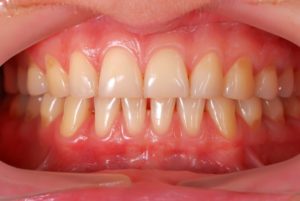Practicing oral care is intended to accomplish two important goals for your overall health. This includes preventing tooth decay and gum disease before they can cause permanent or long-lasting damage. To aid you, your dentist in Hutchinson is writing about periodontal disease, an advanced form of a more common disease known as gingivitis. With advice from them, you can properly equip yourself against gum disease and have a healthy future free of oral disease (and by proxy, more serious diseases outside the mouth.)
What is Gum Disease?
Gum disease is caused by collections of bacteria in the mouth that eventually form plaque, a sticky, colorless material that clings to teeth and gums. If plaque isn’t removed periodically, it can turn into tartar, a hardened form of plaque that requires professional treatment to remove. After enough time, you’ll start to notice the early stages of gum disease, gingivitis.
Gingivitis causes your gums to become inflamed, red, and swollen. It also causes them to bleed more easily. This early stage can eventually turn into periodontitis, a more serious gum condition where inflammation occurs around the tooth. The gums start to pull away from the teeth, causing pockets to form and become infected.
To remove the bacteria, your body’s natural immune response works to break down the bone and tissue holding your teeth in your mouth. This causes your bone, tissue, and gums to dissolve and eventually your teeth will start to fall out.
How Do You Treat and Manage Gum Disease?
When looking for gum disease, consider the following symptoms:
- Chronic bad breath
- Red, swollen, or tender gums
- Sensitive teeth
- Painful chewing
- Bleeding gums after brushing or flossing
If your Hutchinson dentist determines you have gum disease, they’ll recommend periodontal therapy to promptly remove it. This typically includes scaling, root planing, antibiotic therapy, and soft tissue laser treatment to remove dangerous plaque from the gum line.
After undergoing your treatment, you’ll need to start paying more attention to the foods you eat and how they could be contributing to your gum disease. Certain sharp, hard, crunchy, or acidic foods may be difficult to consume due to your sensitive gums, so keep consumption of these to a minimum. In the meantime, take the opportunity to review your oral care routine.
What are the Preventive Steps to Take?
Gum disease is largely preventable if you take the time to care for your oral health. This includes:
- Brushing twice a day for at least two minutes each time with fluoridated toothpaste. Be sure to gently target the gum line during these sessions.
- Floss once a day. If flossing is difficult, use a floss holder that comes with a handle. The best time to floss is right before bed as it prevents food debris and plaque from settling overnight.
- Visit your dentist every 6 months so they can track your progress and provide tips for your technique.
- Eat foods that promote gum health, such as leafy greens, onions, dairy products, green tea, and foods high in vitamin C.
Gum health is easy to manage when you have the right info from your dentist in Hutchinson. Schedule an appointment with them today!

